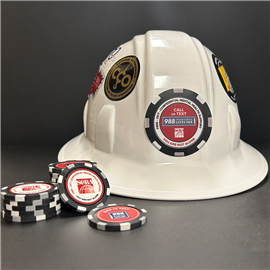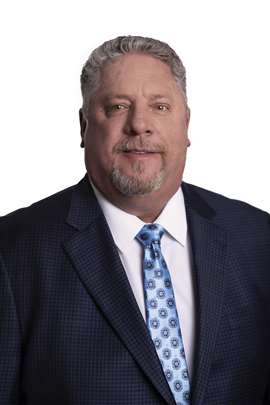How to support worker’s mental health
27 May 2024
SCRA endorses new effort to promote mental health in the trades. Mike Chalmers reports.
As part of an ongoing mental health focus in 2024, SCRA unveiled two new support tools at its recent Annual Conference from 15 to 19 April in Texas, USA.
In line with similar efforts growing in effectiveness throughout the industry, one of the tools is a poker-style chip with language on the front and back assuring chip holders they are not alone, and encouraging them to text or dial the 988 national Suicide & Crisis Lifeline. The second deliverable comprises a 988 Lifeline hard hat sticker – another tool that has seen productive use and positive results since its inception.
 SCRA’s poker-style chip will promote language that assures chip holders they are not alone, and encourages them to text or dial the 988 national Suicide & Crisis Lifeline. (Photo: SCRA)
SCRA’s poker-style chip will promote language that assures chip holders they are not alone, and encourages them to text or dial the 988 national Suicide & Crisis Lifeline. (Photo: SCRA)
The aim is to both create and drive awareness while also giving workers in the trades a viable, around-the-clock resource for mental health support. When people call, text or chat on the 988 Lifeline, they are connected to trained crisis counsellors who are part of the existing 988 Lifeline network, made up of more than 200 local crisis centres.
 An additional mental health deliverable SCRA is promoting comprises a 988 Lifeline hard hat sticker – a tool that has seen productive use and positive results throughout the industry since its inception. (Photo: SCRA)
An additional mental health deliverable SCRA is promoting comprises a 988 Lifeline hard hat sticker – a tool that has seen productive use and positive results throughout the industry since its inception. (Photo: SCRA)
These counsellors are trained to provide free and confidential emotional support and crisis counselling to people in suicidal crisis or emotional distress, and connect them to resources.
In combination with the chips and stickers, SCRA also unveiled a page on its website designed specifically to provide mental health support links to information, for individuals as well as company management.
SCRA’s commitment to getting as much worthwhile support and awareness as it can out to its member companies, and relatedly, to the larger industry, has been a team effort – with more and more member companies joining the endeavour all the time.
“I think with the trades, these are craft people – men and women – though it’s dominated by men… and over the years, while it’s softened a bit, it’s always been a tough-guy, difficult industry to work in,” noted SCRA president Scott Bragg (Bragg Companies). “People bust their butts and put their lives on the line a lot – the stigma that you’re soft if you’re struggling mentally, either with your work or personal life, has been hard for people to deal with over the years. But getting this message out – especially through the 988 number – that it’s okay to ask for help, has never been more important.”
In addition to fully supporting SCRA’s chip and sticker initiative, one thing Bragg Companies is working on through its HR department is figuring out how to work mental health support into its overall health insurance platform for all its employees.
“I personally don’t think we, or our insurance companies, spend enough time, effort or money on developing strong mental health programmes. But hopefully this is a productive first step for us.”
 Scott Bragg, Bragg Companies. (Photo: SCRA)
Scott Bragg, Bragg Companies. (Photo: SCRA)
He also commended SCRA for taking the steps to move mental health to the front of the line. “Any time an Association like SCRA shines a light on a topic as vital to the future of the trades as mental health, it’s going to not only snap everyone to attention, but galvanise the larger collective and dial them into a common mission.”
Worth every effort
Echoing Bragg, SCRA Crane and Rigging Group Chair Jeremy Landry, (Deep South Crane & Rigging), acknowledged that “it has taken a while to shift the industry culture to even report physical injuries, and I think we face the same challenge in mental health.”
 Meghan McNally-Wininger, McNally-Nimergood Crane Rentals. (Photo: SCRA)
Meghan McNally-Wininger, McNally-Nimergood Crane Rentals. (Photo: SCRA)
That said, Landry doesn’t believe there is a one-size-fits-all solution to mental health. “I think it will be different depending on the person and what makes them the most comfortable. The most important step is the first one, and I believe SCRA has done that. The poker chips and hard hat stickers will be a big step towards awareness. And over the next several years, we’ll have to add more tools.”
Transportation Group Chair, Louis Juneau (NOVA Permits & Pilot Cars) explained why the compounding effect of mental health challenges can be so destructive.
“Stigma can decrease self-esteem, leading to a loss of self-respect, while increasing shame and hopelessness. People with mental illness may be viewed in a negative way, which can lead to discrimination and, in turn, more or longer-lasting mental illness.”
Moreover, noted Dave Merrill (Pahoa Express), “So many people can be affected by one person’s mistake. The jobs our members run can be extremely stressful and require mental fortitude to be accomplished without incident.”
 Eddy and Kimberly Kitchen, Kitchen’s Crane & Equipment. (Photo: SCRA)
Eddy and Kimberly Kitchen, Kitchen’s Crane & Equipment. (Photo: SCRA)
As a result, said Eddy and Kimberly Kitchen (Kitchen’s Crane & Equipment), “Removing the stigma from mental health in both construction and transportation could mean saving a life and-or saving a family from the emotional trauma of suicide or drug addiction – and is certainly worth every effort.”
 Jeremy Landry, Deep South Crane & Rigging. (Photo: SCRA)
Jeremy Landry, Deep South Crane & Rigging. (Photo: SCRA)
The Kitchens believe the success of such efforts is dependent on consistent education, workplace training programmes and the development of peer support teams at every level. “These changes can have lasting positive effects for our industry, including a stronger, more productive workforce, more success for companies in our industry, improved industrial output for our country and, certainly, more healthy and happy individuals and families.”
Merrill added, “I think that just starting the discussion will lead to overarching benefits for SCRA members, and the rest of our industry.”
Giant step
At Buckner HeavyLift Cranes, said Meredith Williams, they’re trying to make mental health, as well as support and awareness, a topic of general conversation – similar to how physical health is universally discussed. “At Buckner, we’ve made efforts to highlight the mental health, counselling, therapy and support services that our company insurance provides,” she indicated. “Increasing awareness that these benefits already exist helps employees know they are there and free to use – to get ahead of any issues.
 Dave Merrill, Pahoa Express. (Photo: SCRA)
Dave Merrill, Pahoa Express. (Photo: SCRA)
“We are also in the process of working on a pilot programme to allow our employees to use the money they accrue as part of their safety incentive towards counselling sessions if they elect to do so. Our focus is on how we can help support benefits for employees to take advantage of – to help avoid a crisis.”
Meghan McNally-Wininger (McNally-Nimergood Crane Rentals) sees it the same. “You never know the difference that you can make in someone’s life, and in the lives of those who love and care for them,” she emphasised. “Knowing that someone cares and is there to listen, can make a bad day better.
 Louis Juneau, NOVA Permits & Pilot Cars. (Photo: SCRA)
Louis Juneau, NOVA Permits & Pilot Cars. (Photo: SCRA)
“There is a stigma in this industry, and we need to acknowledge that we created that stigma. It’s up to us to do what we can to fix that – and let people know that there is strength in asking for help. It’s not weak to try to better yourself.”
Disarming stigma is something that Matt Rix (ProLift Rigging) considers a long-time coming across the trades. “For too long no one has wanted to talk about it which makes SCRA’s efforts to build out this conversation so transformative – and we’re glad to be a part of it.”
Rix first remembers hearing about mental health at an SCRA meeting in 2023. “And then the next meeting, I heard a little more – and people were much more engaged,” he pointed out. “They wanted more information. And the Association is, once again, stepping up. Which is vital – because when an organisation as influential as SCRA makes the effort to break down some of these barriers and open up discussions, it’s a giant step in the name of progress that hopefully spreads throughout the industry as a result.”




